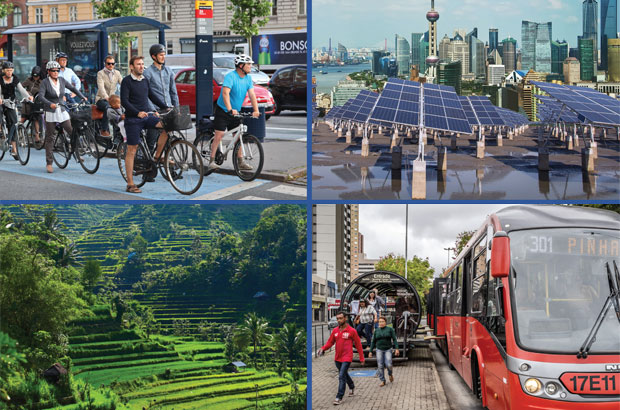A new report shows that there is a clear path to address the risks of climate change while sustaining growth in the global economy and creating jobs. Now is the time for U.S. business leaders to seize opportunities presented by a clean energy economy. By doing so they can address three goals: securing and growing jobs in their own business, demonstrating U.S. leadership on sustainability, and reducing the risks and uncertainties of climate change. Is U.S. business ready to meet the enormous opportunities presented by a coordinated response to our climate, energy, and economic challenges?
Published last month, the New Climate Economy report Better Growth, Better Climate concludes that "countries at all income levels have the opportunity to build lasting economic growth and at the same time reduce the immense risk of climate change. But action is needed now." The report asks two key questions of economic decision makers. First: Can current economic difficulties be overcome and new models of growth be established? and second: can global economic leaders act to reduce climate risk? The evidence presented shows the answer to both questions is yes.
New Climate Economy is the flagship project of the Global Commission on the Economy and Climate. Chaired by Mexico's former President Felipe Calderón, the commission brings together former heads of government and finance ministers and leaders in the fields of economics and business.
A recent report from the Confederation of British Industry also advocates for business engagement on climate policy: "For UK business, climate change is no longer a threat to be feared, but an opportunity to grow the economy and lead the world – and by tackling it, we can make energy safer and more plentiful for all." Read the CBI report: The colour of growth - Maximising the potential of green business.
For contrast, consider this position adopted by the US Chamber of Commerce: "To take full advantage of America’s opportunity, we must allow greater access to our oil and gas resources, recognize the important role of coal in our economy and work to make it cleaner, and develop and deploy advanced technologies, including alternative energy sources, nuclear energy, and energy efficiency."
By supporting legacy oil, gas and coal industries, the US Chamber position places at risk not only the climate but also opportunities for US business leadership in clean energy. The position ignores the increasing economic viability of both wind and solar power. Wind power prices in the US have fallen from nearly $70/MWh in 2009 to around $25/MWh in 2013. (2013 Wind Technologies Market Report, U.S. Department of Energy, August 2014).
Lennar, the United States' second-largest homebuilder, is automatically installing solar panels on the roofs of new homes in California and Colorado. The company typically retains ownership of the panels and signs 20-year deals to sell homeowners the power from their own roofs, at a 20 percent discount from the local utility’s prices (as detailed in the New York Times). Germany--the entire country--will soon be receiving 30% of its power from renewable sources.
If you're a business leader concerned about our changing climate and about society’s ability to change our path, then Better Growth, Better Climate belongs on your reading list. Second, consider becoming a Business Leader for Climate Solutions. Third, contact me or Climate Solutions' Business Partnerships Manager Chris Bast to talk about opportunities.


